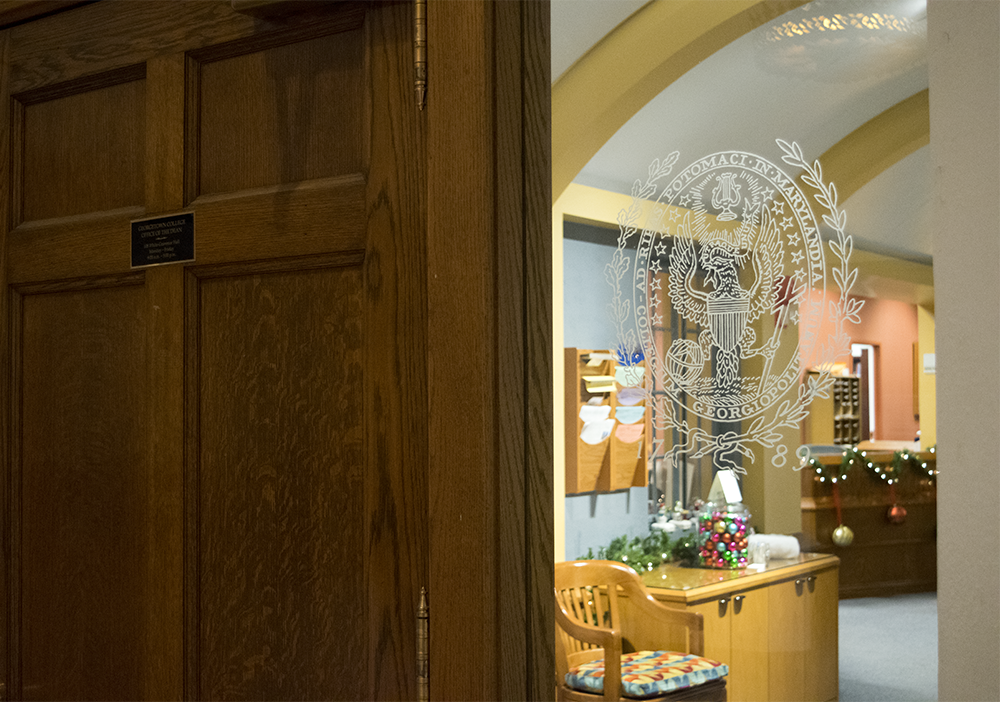
Part of the university’s Designing the Future(s) initiative, Bridge Courses will offer seniors and recent alumni training in professional and personal skills to ease students’ transitions from an academic setting into their professional lives.
The university has launched a new series of one-credit classes exclusively for seniors and recent alumni this spring in order to instill practical skills that can ease students’ transition into professional life after graduation.
The series, Bridge Courses, aims to allow students the opportunity to gain professional and personal skills, reflect on their university experiences and engage in discussions about how to lead a meaningful and fulfilling life.
The courses are part of the university’s Designing the Future(s) initiative. The initiative, launched in November 2013, engages the Georgetown community in exploring and experimenting with new methods to deliver higher education.
All Bridge courses are expected to include between 15 and 20 students in order to maintain a seminar and discussion-centered environment for students. Five one-credit classes are offered this spring.
Each class falls under one of two categories: “Personal and Professional Development,” which looks to prepare students for life after Georgetown, or “Revisiting the Core,” courses that revisit topics covered in earlier courses at Georgetown.
The courses will also be offered online to allow recently-graduated students to participate.
Senior Associate Dean for Undergraduate Affairs and School of Foreign Service professor Daniel Byman said the courses can offer more individualized benefits for students than traditional courses.
“So the hope is that they can apply it to new areas and can think about current issues that are of interest to them, so it can be more individualized in a way that they find helpful,” Byman said.
According to Byman, it is important to actively diversify traditional three-credit courses in order to offer students more learning opportunities.
“Learning doesn’t have to take place in a traditional, twice-a-week, 14 weeks-a-year three-credit class,” Byman said.
Byman is currently teaching a one-credit class in the School of Foreign Service on “Foreign Policy Under Trump,” which has four sections in order to accommodate all cohorts.
The lessons offered in his one-credit class would not be possible within a traditional three-credit structured class, according to Byman.
“Frankly, I don’t think it would be appropriate for a three-credit class, as you can guess, we don’t know enough about Trump’s foreign policy one way or another to do this,” Byman said. “For a one-credit class it’s perfectly reasonable to say we can learn a lot by trying to explore the different directions that Trump might go in because it enables us to try on different topics.”
The classes are not all taught by Georgetown professors. “Life Negotiations,” a class that falls under personal and professional development, will be taught by Andrew Caffey, an attorney at Caffey Law Firm. Caffey emphasized the significance of the practical nature of his course for graduating students.
“The role of my course, ‘Life Negotiations,’ is that it’s trying to be very practical. It’s a practical skillset that graduating seniors I hope, and am pretty confident, will be able to use for the rest of their lives,” Caffey said.
Associate Professor and Chair of the Theology department, Terrence Reynolds, is also teaching a Bridge course titled, “Freud and the Good Life Revisited.” The course is an interdisciplinary class that focuses on core life questions, according to Reynolds.
“It relies upon elements of psychology, sociology, philosophy, theology and history, with a strong ethical component as well,” Reynolds said. “It is designed for all students who wish to engage in a rich conversation about what, in their view, constitutes a good, fulfilled, human life. Freud’s pessimism about our prospects for happiness is largely a jumping-off point.”
Reynolds stated his aim for the course is for students to think about the purpose of their lives.
“My only goals for the course are that students grapple imaginatively and existentially with the authors we read and draw their own conclusions about the struggles and purposes of their lives,” Reynolds said.
Reynolds stressed the need for Bridge courses to complete students’ undergraduate experience.
“Some seniors might appreciate a one-credit opportunity to reconsider some materials they had encountered earlier in their academic careers at Georgetown,” Reynolds said. “Or that they wish they’d had the opportunity to explore.”




















